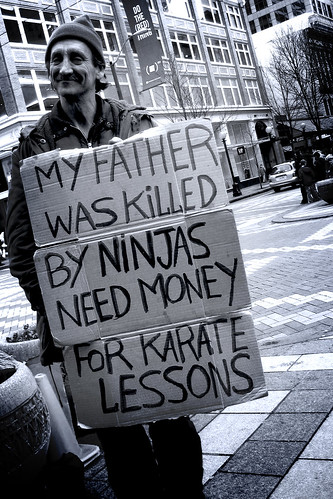
Saturday, December 30, 2006
The War On Terror: September 11, 2001 - December 30, 2006:
The War on Terror ended early Saturday morning, as Saddam Hussein was hanged by the neck until he died. The War on Terror was just over five years old, beginning on September 11th, 2001, with the attacks on the World Trade Center. Finally, with Hussein’s death, all terror everywhere has come to an end.
It’s been a long and arduous process, tracking down and destroying the terror networks that led directly to Hussein, but now the work is done, the mastermind behind the attacks of September 11th has been executed, and we can all rest easy.
The War on Terror ended early Saturday morning, as Saddam Hussein was hanged by the neck until he died. The War on Terror was just over five years old, beginning on September 11th, 2001, with the attacks on the World Trade Center. Finally, with Hussein’s death, all terror everywhere has come to an end.
It’s been a long and arduous process, tracking down and destroying the terror networks that led directly to Hussein, but now the work is done, the mastermind behind the attacks of September 11th has been executed, and we can all rest easy.
Bizarre Bazaar:
There are five men in black face masks who are visible on the gallows platform around Saddam, acting as guards. As they guide him towards the trap door and put the noose over his head, they start chanting religious slogans with the names of Moqtada al Sadr (the head of the Mahdi army, accused of organizing death squads against Sunnis) and Baqr al Sadr (the father-in-law of Moqtada). Saddam, a Sunni, is outraged at this last-minute provocation, and tells them to “go to hell.” This is generally where the two TV stations cut the video, but on at least one occasion that we saw, Arabiya allowed the video to keep rolling: The cell phone camera is jerked down to the ground, as if the person holding it had to conceal the camera, then it is slowly raised up to Saddam again, and suddenly his body shoots down through the trapdoor. At this, the Arabiya anchor came on and made a scissors symbol with two fingers with a mischievous grin on his face, as if to say that they really shouldn’t have shown that, but so be it. A cynical voyeuristic ploy, nudge nudge wink wink…
However, the impact of this video could be quite significant. First, it may reinforce Sunni suspicions that the execution of Saddam was merely an act of Shiite revenge for decades of repression under Saddam. The building where the execution took place was expressly chosen because it was once used as a detention center by a division of Saddam’s secret police that was focused on the Shiite Dawa party. Some of the witnesses whom the government invited to the execution had themselves once been tortured in that same building. Indeed, Prime Minister Maliki, who signed the execution order the day before the hanging, is a long-term member of the Dawa party and had himself been sentenced to death by Saddam back in 1980 before fleeing the country.
Worse, it may also reinforce the fears of Sunnis that Maliki’s government is beholden to the Mahdi army, Moqtada’s militia. Executions are generally expected to be solemn affairs –- certainly not opportunities for thugs to score some final sectarian points before the “enemy” is disposed of. The video itself seems quite distasteful –- but it is informative to the extent that it reveals the political baggage that the current government carries on its shoulders. It does not add up to a pretty picture.
There are five men in black face masks who are visible on the gallows platform around Saddam, acting as guards. As they guide him towards the trap door and put the noose over his head, they start chanting religious slogans with the names of Moqtada al Sadr (the head of the Mahdi army, accused of organizing death squads against Sunnis) and Baqr al Sadr (the father-in-law of Moqtada). Saddam, a Sunni, is outraged at this last-minute provocation, and tells them to “go to hell.” This is generally where the two TV stations cut the video, but on at least one occasion that we saw, Arabiya allowed the video to keep rolling: The cell phone camera is jerked down to the ground, as if the person holding it had to conceal the camera, then it is slowly raised up to Saddam again, and suddenly his body shoots down through the trapdoor. At this, the Arabiya anchor came on and made a scissors symbol with two fingers with a mischievous grin on his face, as if to say that they really shouldn’t have shown that, but so be it. A cynical voyeuristic ploy, nudge nudge wink wink…
However, the impact of this video could be quite significant. First, it may reinforce Sunni suspicions that the execution of Saddam was merely an act of Shiite revenge for decades of repression under Saddam. The building where the execution took place was expressly chosen because it was once used as a detention center by a division of Saddam’s secret police that was focused on the Shiite Dawa party. Some of the witnesses whom the government invited to the execution had themselves once been tortured in that same building. Indeed, Prime Minister Maliki, who signed the execution order the day before the hanging, is a long-term member of the Dawa party and had himself been sentenced to death by Saddam back in 1980 before fleeing the country.
Worse, it may also reinforce the fears of Sunnis that Maliki’s government is beholden to the Mahdi army, Moqtada’s militia. Executions are generally expected to be solemn affairs –- certainly not opportunities for thugs to score some final sectarian points before the “enemy” is disposed of. The video itself seems quite distasteful –- but it is informative to the extent that it reveals the political baggage that the current government carries on its shoulders. It does not add up to a pretty picture.
1990-1995: Microsoft's Yellow Road to Cairo:
Even shipping Windows 95 became a difficult task. In early 1994, Jim Allchin announced that Microsoft was reassigning more programmers to work on Windows 95, and that Cairo would be delayed until late 1995.
By the end of 1994, Microsoft Vice President Mike Maples was quoted as saying that Cairo would slip again, to "sometime in 1996."
A year later, at the end of 1995, Microsoft shipped Windows 95 with what it described as a subset of the Cairo user interface. However, Windows 95 didn't offer the world anything new in user interface technology. It copied liberally from both the Mac and NeXT, and was commonly criticized in the phrase "Windows 95 = Mac '89."
At the release of Windows 95, Microsoft announced that a "first test version" of Cairo would debut in late 1996, with the actual release happening in 1997, more than half a decade after its original announcement.
By 1996 however, Cairo was being described as a vision instead of a real product. In a Computerworld interview, Bill Gates said, "Cairo is a futuristic system. It's something we're working on."
After a half decade of being presented as a legitimate competitor to NeXT's object oriented development tools and various other products, Cairo was revealed as a complete hoax.
Microsoft had fooled the world with a story about delivering the equivalent of NeXT only a few years late, but only ended up shipping a rewarmed version of the 1990 DOS based Windows, and an unworkable, unstable new OS kernel in NT that was not ready for prime time.
Even shipping Windows 95 became a difficult task. In early 1994, Jim Allchin announced that Microsoft was reassigning more programmers to work on Windows 95, and that Cairo would be delayed until late 1995.
By the end of 1994, Microsoft Vice President Mike Maples was quoted as saying that Cairo would slip again, to "sometime in 1996."
A year later, at the end of 1995, Microsoft shipped Windows 95 with what it described as a subset of the Cairo user interface. However, Windows 95 didn't offer the world anything new in user interface technology. It copied liberally from both the Mac and NeXT, and was commonly criticized in the phrase "Windows 95 = Mac '89."
At the release of Windows 95, Microsoft announced that a "first test version" of Cairo would debut in late 1996, with the actual release happening in 1997, more than half a decade after its original announcement.
By 1996 however, Cairo was being described as a vision instead of a real product. In a Computerworld interview, Bill Gates said, "Cairo is a futuristic system. It's something we're working on."
After a half decade of being presented as a legitimate competitor to NeXT's object oriented development tools and various other products, Cairo was revealed as a complete hoax.
Microsoft had fooled the world with a story about delivering the equivalent of NeXT only a few years late, but only ended up shipping a rewarmed version of the 1990 DOS based Windows, and an unworkable, unstable new OS kernel in NT that was not ready for prime time.
The Art of Baby Wearing:
Dara Freed has never used a stroller. She and her husband have carried their 18-month old baby Haakon in slings since he was born. “I can’t imagine using a stroller in the city,” says Freed, a Williamsburg resident. “It is so much easier to use a sling. I would never bring a stroller on the subway.”
Baby wearing has gained popularity in New York in recent years, as many new types of slings have come on the market and the benefits of baby wearing have become more known.
Dara Freed has never used a stroller. She and her husband have carried their 18-month old baby Haakon in slings since he was born. “I can’t imagine using a stroller in the city,” says Freed, a Williamsburg resident. “It is so much easier to use a sling. I would never bring a stroller on the subway.”
Baby wearing has gained popularity in New York in recent years, as many new types of slings have come on the market and the benefits of baby wearing have become more known.
My Way News - Saddam Hanged for War Crimes in Iraq:
Saddam Hussein struggled briefly after American military guards handed him over to Iraqi executioners. But as his final moments approached, he grew calm.
He clutched a Quran as he was led to the gallows, and in one final moment of defiance, refused to have a hood pulled over his head before facing the same fate he was accused of inflicting on countless thousands during a quarter-century of ruthless power.
Saddam Hussein struggled briefly after American military guards handed him over to Iraqi executioners. But as his final moments approached, he grew calm.
He clutched a Quran as he was led to the gallows, and in one final moment of defiance, refused to have a hood pulled over his head before facing the same fate he was accused of inflicting on countless thousands during a quarter-century of ruthless power.
‘The Sublet Experiment’ Puts a Different Spin on Home Theater - New York Times:
Going to the theater is, in many ways, a respectable sort of voyeurism. You pay for your ticket, grab a program and sit down in the dark to peek into the inner lives of complete strangers. It’s like flipping through an Architectural Digest of other people’s neuroses.
“The Sublet Experiment” is a play that taps into the thrills of theater’s psychological voyeurism but also includes the shallower pleasures of the real estate variety: it is presented every weekend in a different apartment. The play, written and conceived by Ethan Youngerman, has so far been put on in apartments in the neighborhoods of Washington Heights; Greenwich Village; Astoria, Queens; and Chelsea.
Going to the theater is, in many ways, a respectable sort of voyeurism. You pay for your ticket, grab a program and sit down in the dark to peek into the inner lives of complete strangers. It’s like flipping through an Architectural Digest of other people’s neuroses.
“The Sublet Experiment” is a play that taps into the thrills of theater’s psychological voyeurism but also includes the shallower pleasures of the real estate variety: it is presented every weekend in a different apartment. The play, written and conceived by Ethan Youngerman, has so far been put on in apartments in the neighborhoods of Washington Heights; Greenwich Village; Astoria, Queens; and Chelsea.
Straight Dope Staff Report: Do Eskimo men lend their wives to strangers?:
It's true Eskimo men sometimes let other men sleep with their wives. But did they offer that privilege to any horny schmuck who showed up on the front stoop? Generally not. The lending of wives to perfect strangers happened occasionally in some places, but it was never the widespread custom it has been made out to be.
There were several contexts in which a husband would let another man sleep with his wife. The most widespread was ritual spouse exchange, practiced in one form or another in every region where Eskimos lived, from eastern Greenland to the Bering Sea. This sort of spouse exchange was always associated with a religious purpose, and was always done at the instigation of an angekok (shaman). Often the point was to effect some desired outcome, such as better weather or hunting conditions.
The best known example of ritual spouse exchange was the "putting-out-of-the-lamps game" played in Greenland. This was a sort of combination of seven minutes in heaven, Roman orgy, and prayer meeting. The prayer-meeting aspect failed to overcome the objections of the early Christian missionaries, one of whom called it the "whore game." Those guys really know how to ruin a party. To play at home: gather together a number of married couples (according to some sources, singles could play too); wait for the angekok to contact the spirits; turn out the lights; screw a random member of the opposite sex; turn on the lights. The idea seemed to be that the spirits would be more willing to cooperate if you did it that way. Who are we to disappoint the spirits? This game was played only in Greenland, but other spouse-exchange rituals were practiced elsewhere. One example from Alaska was called the "bladder feast," which sounds a bit less appetizing. (Despite the name, the bladders weren't eaten, and sex was only a minor part of the festivities).
It's true Eskimo men sometimes let other men sleep with their wives. But did they offer that privilege to any horny schmuck who showed up on the front stoop? Generally not. The lending of wives to perfect strangers happened occasionally in some places, but it was never the widespread custom it has been made out to be.
There were several contexts in which a husband would let another man sleep with his wife. The most widespread was ritual spouse exchange, practiced in one form or another in every region where Eskimos lived, from eastern Greenland to the Bering Sea. This sort of spouse exchange was always associated with a religious purpose, and was always done at the instigation of an angekok (shaman). Often the point was to effect some desired outcome, such as better weather or hunting conditions.
The best known example of ritual spouse exchange was the "putting-out-of-the-lamps game" played in Greenland. This was a sort of combination of seven minutes in heaven, Roman orgy, and prayer meeting. The prayer-meeting aspect failed to overcome the objections of the early Christian missionaries, one of whom called it the "whore game." Those guys really know how to ruin a party. To play at home: gather together a number of married couples (according to some sources, singles could play too); wait for the angekok to contact the spirits; turn out the lights; screw a random member of the opposite sex; turn on the lights. The idea seemed to be that the spirits would be more willing to cooperate if you did it that way. Who are we to disappoint the spirits? This game was played only in Greenland, but other spouse-exchange rituals were practiced elsewhere. One example from Alaska was called the "bladder feast," which sounds a bit less appetizing. (Despite the name, the bladders weren't eaten, and sex was only a minor part of the festivities).
Friday, December 29, 2006
Boing Boing: Report: HD-DVD copy protection defeated:
A hacker known as Muslix64 posted on the Internet details of how he unlocked the encryption, known as the Advanced Access Content System, which prevents high-definition discs from illegal copying by restricting which devices can play them.
The AACS system was developed by companies including Walt Disney Co., Intel Corp., Microsoft Corp., Toshiba Corp. and Sony Corp. to protect high-definition formats, including Toshiba's HD-DVD and Sony's Blu-ray.
Muslix64 posted a video and decryption codes showing how to copy several films, including Warner Bros' "Full Metal Jacket" and Universal Studios' "Van Helsing," on a popular hacker Internet blog and a video-sharing site.
The hacker also promised to post more source code on January 2 that will allow users to copy a wider range of titles.
THAT DIDN'T TAKE LONG.
A hacker known as Muslix64 posted on the Internet details of how he unlocked the encryption, known as the Advanced Access Content System, which prevents high-definition discs from illegal copying by restricting which devices can play them.
The AACS system was developed by companies including Walt Disney Co., Intel Corp., Microsoft Corp., Toshiba Corp. and Sony Corp. to protect high-definition formats, including Toshiba's HD-DVD and Sony's Blu-ray.
Muslix64 posted a video and decryption codes showing how to copy several films, including Warner Bros' "Full Metal Jacket" and Universal Studios' "Van Helsing," on a popular hacker Internet blog and a video-sharing site.
The hacker also promised to post more source code on January 2 that will allow users to copy a wider range of titles.
THAT DIDN'T TAKE LONG.
X-51 Hypersonic Cruise Missile: The Pentagon's Prompt Global Strike Weapon Plan - Popular Mechanics:
First, there's the matter of intelligence. If a president is going to launch the first intercontinental ballistic missile attack in history, he'll need overwhelming evidence. Our ability to nail down that kind of quality information is patchy, at best. On March 19, 2003, the United States launched 40 cruise missiles at three locations outside Baghdad in hopes of killing Saddam Hussein and other senior military officials. It turned out the former Iraqi leader wasn't in any of the locations; the strikes killed at least a dozen people, although it's not clear if they were civilians or leadership targets.
The mission failed even though friendly forces controlled the area. At the heart of Prompt Global Strike is a much darker scenario: American troops are far from their intended target — or the enemy's air defenses are too tough to penetrate. "So let me get this straight," says Jeffrey Lewis, a Harvard University nuclear energy and weapons analyst. "We've got exquisite, fleeting intelligence in an area of immediate concern, but no forces nearby and, miraculously, a sub in just the right spot to attack. I suppose there's some chance of that. But it's pretty small."
More difficult to explain is how a conventional Trident could be launched without provoking a crisis even bigger than the one that it was meant to solve. The Navy's plan calls for arming Ohio class subs with two conventional and 22 nuclear Trident II missiles. (The Navy intends to cut its Ohio class fleet from 18 to 14 subs, with 12 in the water at any one time.) To outside observers, the subs' conventional and nuclear weapons would appear identical — the same size, the same speed, shooting from the same location.
First, there's the matter of intelligence. If a president is going to launch the first intercontinental ballistic missile attack in history, he'll need overwhelming evidence. Our ability to nail down that kind of quality information is patchy, at best. On March 19, 2003, the United States launched 40 cruise missiles at three locations outside Baghdad in hopes of killing Saddam Hussein and other senior military officials. It turned out the former Iraqi leader wasn't in any of the locations; the strikes killed at least a dozen people, although it's not clear if they were civilians or leadership targets.
The mission failed even though friendly forces controlled the area. At the heart of Prompt Global Strike is a much darker scenario: American troops are far from their intended target — or the enemy's air defenses are too tough to penetrate. "So let me get this straight," says Jeffrey Lewis, a Harvard University nuclear energy and weapons analyst. "We've got exquisite, fleeting intelligence in an area of immediate concern, but no forces nearby and, miraculously, a sub in just the right spot to attack. I suppose there's some chance of that. But it's pretty small."
More difficult to explain is how a conventional Trident could be launched without provoking a crisis even bigger than the one that it was meant to solve. The Navy's plan calls for arming Ohio class subs with two conventional and 22 nuclear Trident II missiles. (The Navy intends to cut its Ohio class fleet from 18 to 14 subs, with 12 in the water at any one time.) To outside observers, the subs' conventional and nuclear weapons would appear identical — the same size, the same speed, shooting from the same location.
Thursday, December 28, 2006
Boing Boing: What's ahead in 2007? Predictions from 7 thinkers.:
Ballmer had this and this only to say about 2007, "You'll be back in control."
How viciously will this man have to insult his customers before they just go away? The Vista licensing agreement is being described as the "world's longest suicide note." Has Steve read it? Did you know that it goes WAY beyond DRM on content... to the extent of reserving the right remotely to disable YOUR hardware should MS decide at some time in the future that it's not up to snuff? "Back" in control? Does he imply that I am already out of control? Suppose I am, how much of that is due to his handiwork?
Never mind Steve. I have converted one of my old machines to Linux and so have begun the process of stepping away from my 23 years of MS experience to make his arrogantly worded prediction come true -- at least for me. By the end of '07 I hope to be running none of his products anywhere in my life.
Ballmer had this and this only to say about 2007, "You'll be back in control."
How viciously will this man have to insult his customers before they just go away? The Vista licensing agreement is being described as the "world's longest suicide note." Has Steve read it? Did you know that it goes WAY beyond DRM on content... to the extent of reserving the right remotely to disable YOUR hardware should MS decide at some time in the future that it's not up to snuff? "Back" in control? Does he imply that I am already out of control? Suppose I am, how much of that is due to his handiwork?
Never mind Steve. I have converted one of my old machines to Linux and so have begun the process of stepping away from my 23 years of MS experience to make his arrogantly worded prediction come true -- at least for me. By the end of '07 I hope to be running none of his products anywhere in my life.
Foolsapalooza:
The police had detained Tharp—a sometime Seattle theater artist who was part of an infamous company called Piece of Meat and has been teaching English in Pusan, South Korea, for the past two and a half years—over a sketch comedy he helped produce. Called Babo-palooza (babo is Korean for "fool"), the show sold out two nights in a 60-seat theater with bits about drunken English teachers, overzealous customs agents, and some doggerel about dog-meat soup, called boshintang: "I will not eat this boshintang. I will not eat it, Kang-Jae Wang." It was, Tharp said, a silly evening that gently mocked both Koreans and Westerners.
Less than two weeks later, police came to the university where Tharp works and detained him and another performer for questioning, fingerprinting, and a drug test. "Luckily, we were all clean," he said. "In Korea, failing a piss test is the same as possession: You go to jail for a few months and get deported." At the station, he remembered selling one of his interrogators a ticket: Two undercover detectives had attended the show. The police said that the performance violated the expatriates' work visas, but most of the questioning was about the content: why it was called Babo-palooza, what the jokes meant, what the performers were "trying to say."
The police had detained Tharp—a sometime Seattle theater artist who was part of an infamous company called Piece of Meat and has been teaching English in Pusan, South Korea, for the past two and a half years—over a sketch comedy he helped produce. Called Babo-palooza (babo is Korean for "fool"), the show sold out two nights in a 60-seat theater with bits about drunken English teachers, overzealous customs agents, and some doggerel about dog-meat soup, called boshintang: "I will not eat this boshintang. I will not eat it, Kang-Jae Wang." It was, Tharp said, a silly evening that gently mocked both Koreans and Westerners.
Less than two weeks later, police came to the university where Tharp works and detained him and another performer for questioning, fingerprinting, and a drug test. "Luckily, we were all clean," he said. "In Korea, failing a piss test is the same as possession: You go to jail for a few months and get deported." At the station, he remembered selling one of his interrogators a ticket: Two undercover detectives had attended the show. The police said that the performance violated the expatriates' work visas, but most of the questioning was about the content: why it was called Babo-palooza, what the jokes meant, what the performers were "trying to say."
FT.com / Companies / IT - Apple ‘falsified’ files on Jobs’ options:
Steve Jobs, chief executive of Apple Computer, was handed 7.5m stock options in 2001 without the required authorisation from the company’s board of directors, according to people familiar with the matter.
Records that purported to show a full board meeting had taken place to approve Mr Jobs’ remuneration, as required by Apple’s procedures, were later falsified. These are now among the pieces of evidence being weighed by the Securities and Exchange Commission as it decides whether to pursue a case against the company or any individuals over the affair, according to these people.
Steve Jobs, chief executive of Apple Computer, was handed 7.5m stock options in 2001 without the required authorisation from the company’s board of directors, according to people familiar with the matter.
Records that purported to show a full board meeting had taken place to approve Mr Jobs’ remuneration, as required by Apple’s procedures, were later falsified. These are now among the pieces of evidence being weighed by the Securities and Exchange Commission as it decides whether to pursue a case against the company or any individuals over the affair, according to these people.
Roger Boisjoly - Wikipedia, the free encyclopedia:
Eventually, in late 1985 Boisjoly advised his managers that - if the problem was not fixed, there was a distinct chance that a shuttle mission would end in disaster. No action was taken.
Following the announcement that the Challenger mission was confirmed for 28 January 1986, Boisjoly and his colleagues determined to try and stop the flight. Temperatures were due to be down to -14°C overnight. Boisjoly felt that this would severely compromise the safety of the O-Ring - and potentially lose the flight.
The matter was discussed with Morton Thiokol management - who agreed that the issue was serious enough to recommend delaying the flight. They arranged a telephone conference with NASA management and gave their findings. However, after a while, the Morton Thiokol managers asked for a few minutes off the phone to discuss their final position again. Despite the efforts of Boisjoly and others in this off-air briefing, the Morton Thiokol managers decided to advise NASA that their data was inconclusive. NASA asked if anyone objected. Boisjoly stayed silent and the decision to fly the ill-fated STS-51L Challenger mission was made.
Boisjoly's theory of a massive disaster proved to be correct when, on the morning of January 28, 1986, at Cape Canaveral, 73 seconds into the mission, the space shuttle Challenger disintegrated, killing its seven member crew. In fact, Boisjoly was quite relieved when the flight lifted off, as his investigations had predicted that the SRB would explode during the initial take-off. 73 seconds later he witnessed the shuttle explosion on TV.
After Ronald Reagan ordered a Presidential Committee to review the disaster, Boisjoly was one of the witnesses called. He gave accounts of how and why he felt the O-Rings had failed. After the Committee gave its findings, Boisjoly found himself shunned by colleagues and managers and he resigned from the company.
Eventually, in late 1985 Boisjoly advised his managers that - if the problem was not fixed, there was a distinct chance that a shuttle mission would end in disaster. No action was taken.
Following the announcement that the Challenger mission was confirmed for 28 January 1986, Boisjoly and his colleagues determined to try and stop the flight. Temperatures were due to be down to -14°C overnight. Boisjoly felt that this would severely compromise the safety of the O-Ring - and potentially lose the flight.
The matter was discussed with Morton Thiokol management - who agreed that the issue was serious enough to recommend delaying the flight. They arranged a telephone conference with NASA management and gave their findings. However, after a while, the Morton Thiokol managers asked for a few minutes off the phone to discuss their final position again. Despite the efforts of Boisjoly and others in this off-air briefing, the Morton Thiokol managers decided to advise NASA that their data was inconclusive. NASA asked if anyone objected. Boisjoly stayed silent and the decision to fly the ill-fated STS-51L Challenger mission was made.
Boisjoly's theory of a massive disaster proved to be correct when, on the morning of January 28, 1986, at Cape Canaveral, 73 seconds into the mission, the space shuttle Challenger disintegrated, killing its seven member crew. In fact, Boisjoly was quite relieved when the flight lifted off, as his investigations had predicted that the SRB would explode during the initial take-off. 73 seconds later he witnessed the shuttle explosion on TV.
After Ronald Reagan ordered a Presidential Committee to review the disaster, Boisjoly was one of the witnesses called. He gave accounts of how and why he felt the O-Rings had failed. After the Committee gave its findings, Boisjoly found himself shunned by colleagues and managers and he resigned from the company.
Wednesday, December 27, 2006
What’s Wrong With Cinderella? - New York Times:
Diana may be dead and Masako disgraced, but here in America, we are in the midst of a royal moment. To call princesses a “trend” among girls is like calling Harry Potter a book. Sales at Disney Consumer Products, which started the craze six years ago by packaging nine of its female characters under one royal rubric, have shot up to $3 billion, globally, this year, from $300 million in 2001. There are now more than 25,000 Disney Princess items. “Princess,” as some Disney execs call it, is not only the fastest-growing brand the company has ever created; they say it is on its way to becoming the largest girls’ franchise on the planet.
Meanwhile in 2001, Mattel brought out its own “world of girl” line of princess Barbie dolls, DVDs, toys, clothing, home décor and myriad other products. At a time when Barbie sales were declining domestically, they became instant best sellers. Shortly before that, Mary Drolet, a Chicago-area mother and former Claire’s and Montgomery Ward executive, opened Club Libby Lu, now a chain of mall stores based largely in the suburbs in which girls ages 4 to 12 can shop for “Princess Phones” covered in faux fur and attend “Princess-Makeover Birthday Parties.” Saks bought Club Libby Lu in 2003 for $12 million and has since expanded it to 87 outlets; by 2005, with only scant local advertising, revenues hovered around the $46 million mark, a 53 percent jump from the previous year. Pink, it seems, is the new gold.
Diana may be dead and Masako disgraced, but here in America, we are in the midst of a royal moment. To call princesses a “trend” among girls is like calling Harry Potter a book. Sales at Disney Consumer Products, which started the craze six years ago by packaging nine of its female characters under one royal rubric, have shot up to $3 billion, globally, this year, from $300 million in 2001. There are now more than 25,000 Disney Princess items. “Princess,” as some Disney execs call it, is not only the fastest-growing brand the company has ever created; they say it is on its way to becoming the largest girls’ franchise on the planet.
Meanwhile in 2001, Mattel brought out its own “world of girl” line of princess Barbie dolls, DVDs, toys, clothing, home décor and myriad other products. At a time when Barbie sales were declining domestically, they became instant best sellers. Shortly before that, Mary Drolet, a Chicago-area mother and former Claire’s and Montgomery Ward executive, opened Club Libby Lu, now a chain of mall stores based largely in the suburbs in which girls ages 4 to 12 can shop for “Princess Phones” covered in faux fur and attend “Princess-Makeover Birthday Parties.” Saks bought Club Libby Lu in 2003 for $12 million and has since expanded it to 87 outlets; by 2005, with only scant local advertising, revenues hovered around the $46 million mark, a 53 percent jump from the previous year. Pink, it seems, is the new gold.
Gerald Goddamned Ford | Features | The Stranger, Seattle's Only Newspaper:
The first month of Gerald Goddamned Ford’s presidency, as detailed in Barry Werth’s recent book 31 Days, turned out to be one of the biggest disasters in American history. Ford failed the one mission that mattered: not pardoning Richard Nixon. The only thing he had to do to come out of the presidency with a legacy was not pardon Richard Nixon. It took Ford a month to fuck that up and then he dared to announce that “our long national nightmare is over.”
That’s bullshit, and we’ll get to precisely why in a moment. First, it has to be said that the stench of Gerald Goddamned Ford, the Presidential Shitrag, lingers in the White House to this day. Though he opted to not nominate the odious George H. W. Bush as his vice president, choosing instead Nelson Rockefeller, Ford hired men whose names we’re still living with today: Dick Cheney replaced Donald Rumsfeld as Chief of Staff after Ford named Rumsfeld Secretary of Defense. It was Ford that gave both these men toe-holds in the Executive Branch, positions that paid off big for them and, um, for us, 25 years later.
The first month of Gerald Goddamned Ford’s presidency, as detailed in Barry Werth’s recent book 31 Days, turned out to be one of the biggest disasters in American history. Ford failed the one mission that mattered: not pardoning Richard Nixon. The only thing he had to do to come out of the presidency with a legacy was not pardon Richard Nixon. It took Ford a month to fuck that up and then he dared to announce that “our long national nightmare is over.”
That’s bullshit, and we’ll get to precisely why in a moment. First, it has to be said that the stench of Gerald Goddamned Ford, the Presidential Shitrag, lingers in the White House to this day. Though he opted to not nominate the odious George H. W. Bush as his vice president, choosing instead Nelson Rockefeller, Ford hired men whose names we’re still living with today: Dick Cheney replaced Donald Rumsfeld as Chief of Staff after Ford named Rumsfeld Secretary of Defense. It was Ford that gave both these men toe-holds in the Executive Branch, positions that paid off big for them and, um, for us, 25 years later.
tiny nibbles - violet blue:
In recent weeks, Google has been changing its search algorithms and now many (though not all) sex websites have been dropped -- including this one. It seems to have coincided with changes they made relating to their pay-for-play keyword ad program, AdSense. What's disturbing to me (besides the harm it's done to small businesses over the holidays) is that Google's snafu seems to have dropped more sex-positive businesses (that focus on accurate sex ed) than big-gun, mainstream adult businesses (that sell unsafe sex toys and skanky product). To me, this also shows the huge problem with having a monoculture wherin a single business is depended on to provide a communication service. They screw one thing up, and an essential feature (like access to accurate search result information) disappears.
In recent weeks, Google has been changing its search algorithms and now many (though not all) sex websites have been dropped -- including this one. It seems to have coincided with changes they made relating to their pay-for-play keyword ad program, AdSense. What's disturbing to me (besides the harm it's done to small businesses over the holidays) is that Google's snafu seems to have dropped more sex-positive businesses (that focus on accurate sex ed) than big-gun, mainstream adult businesses (that sell unsafe sex toys and skanky product). To me, this also shows the huge problem with having a monoculture wherin a single business is depended on to provide a communication service. They screw one thing up, and an essential feature (like access to accurate search result information) disappears.
Wired News: Vaporware '06: Return of the King:
Pull back the red curtain and dim the lights. It's the 9th annual presentation of the Wired News Vaporware Awards, our ode to the year's top technology products promised, hyped and scheduled, but not delivered.
The nominees were chosen by you, our readers, in November. We've sifted through the submissions and selected the 10 finalists. The race was tight this year, but we've managed to declare a winner. OK, maybe it wasn't that tight.
Pull back the red curtain and dim the lights. It's the 9th annual presentation of the Wired News Vaporware Awards, our ode to the year's top technology products promised, hyped and scheduled, but not delivered.
The nominees were chosen by you, our readers, in November. We've sifted through the submissions and selected the 10 finalists. The race was tight this year, but we've managed to declare a winner. OK, maybe it wasn't that tight.
Faked Docs May Be Core of Apple Case:
It must be some consolation for Apple Computer that the company's annual report is going to be published during the slowest news week of the year.
Given the uncomfortable admissions about its past stock options practices — and the cost to the company — that Apple will have to make in the delayed SEC filing due by Friday, less public attention is probably a good thing.
But the lull is unlikely to last long. According to people with knowledge of Apple's situation, federal prosecutors are looking closely at stock option administration documents that were apparently falsified by company officials to maximize the profitability of option grants to executives.
It must be some consolation for Apple Computer that the company's annual report is going to be published during the slowest news week of the year.
Given the uncomfortable admissions about its past stock options practices — and the cost to the company — that Apple will have to make in the delayed SEC filing due by Friday, less public attention is probably a good thing.
But the lull is unlikely to last long. According to people with knowledge of Apple's situation, federal prosecutors are looking closely at stock option administration documents that were apparently falsified by company officials to maximize the profitability of option grants to executives.
Brooklyn Record: Beware of the Phantom on Cropsey Ave:
At 2255 Cropsey Ave. in Bensonhurst, there is a curb cut that once led to the circular driveway for a house demolished almost a century ago. The driveway is long gone, and has been replaced by a fence, but those who park along this patch of curb are slapped with $160 tickets. Police from the 62nd Precinct did not return calls, but city officials agree that these tickets are ridiculous.
At 2255 Cropsey Ave. in Bensonhurst, there is a curb cut that once led to the circular driveway for a house demolished almost a century ago. The driveway is long gone, and has been replaced by a fence, but those who park along this patch of curb are slapped with $160 tickets. Police from the 62nd Precinct did not return calls, but city officials agree that these tickets are ridiculous.
Careless World
This is a careless world without your voice.
Courtesy is gone; nobody tips their hats.
There is no one to name the shrubs and birds,
To suggest a heavier coat.
You watched while I stood by the window
Saying goodbye to Sixth Avenue.
The pavement was always being torn away.
Watching the hammers
I kissed the glass four times;
Once for you and mother
And Richard and me.
You knew that four was a special number,
My number for watching things end.
You, at the door, made the room mine.
In five months I have lost your voice.
Its tone, a clearing throat;
Trailing off, "be a good girl."
Louise Katz
This is a careless world without your voice.
Courtesy is gone; nobody tips their hats.
There is no one to name the shrubs and birds,
To suggest a heavier coat.
You watched while I stood by the window
Saying goodbye to Sixth Avenue.
The pavement was always being torn away.
Watching the hammers
I kissed the glass four times;
Once for you and mother
And Richard and me.
You knew that four was a special number,
My number for watching things end.
You, at the door, made the room mine.
In five months I have lost your voice.
Its tone, a clearing throat;
Trailing off, "be a good girl."
Louise Katz
The effectiveness of self-imposed deadlines on procrastination « Tasty Research:
Why do people procrastinate? This is an effect psychologists attribute to “hyperbolic time discounting”: the immediate rewards are disproportionally more compelling than the greater delayed costs. In other words, Procrastination itself is the reward.
However, the eventual cost of neglecting a task has such an impact on people that they learn to impose deadlines on themselves to restrict their own behavior. At what lengths do people do this? This article looks at three questions:
1. Do people self-impose costly deadlines on tasks in which procrastination may impede performance?
2. Are self-imposed deadlines effective in improving task performance?
3. Do people set their deadlines optimally, for maximum performance enhancement?
Why do people procrastinate? This is an effect psychologists attribute to “hyperbolic time discounting”: the immediate rewards are disproportionally more compelling than the greater delayed costs. In other words, Procrastination itself is the reward.
However, the eventual cost of neglecting a task has such an impact on people that they learn to impose deadlines on themselves to restrict their own behavior. At what lengths do people do this? This article looks at three questions:
1. Do people self-impose costly deadlines on tasks in which procrastination may impede performance?
2. Are self-imposed deadlines effective in improving task performance?
3. Do people set their deadlines optimally, for maximum performance enhancement?
Tuesday, December 26, 2006
Rolling Stone : Being James Brown:
So, the James Brown statue may seem to have walked on its flat bronze feet the mile from Twiggs to Broad, to which it keeps its back, reserving its grin for the gentlefolk on and across Broad Street, the side that gives way to the river -- the white neighborhoods to which James Brown, as a shoeshine boy, hustler, juvenile delinquent, possibly even as a teenage pimp, directed his ambition and guile. Policemen regularly chased James Brown the length of that mile, back toward Twiggs -- he tells stories of diving into a watery gutter, barely more than a trench, and hiding underwater with an upraised reed for breathing while the policemen rumbled past -- and, once the chase was over, he'd creep again toward Broad, where the lights and music were, where the action was, where Augusta's stationed soldiers with their monthly paycheck binges were to be found. Eventually, the city of Augusta jailed the teenager, sentenced him to eight-to-sixteen for four counts of breaking and entering. When he attained an early release, with the support of the family of his friend and future bandmate Bobby Byrd, it was on the condition that he never return to Augusta. Deep into the Sixties, years past "Papa's Got a Brand New Bag," James Brown had to apply for special permits to bring his band to perform in Augusta; he essentially had been exiled from the city for having the audacity to transverse that mile from Twiggs to Broad. Now his statue stands at the end of the mile, facing away. Grinning. Resolving nothing. James Brown, you see, may in fact be less a statue than any human being who ever lived. James Brown is kinetic; an idea, a problem, a genre, a concept, a method -- anything, really, but a statue.
So, the James Brown statue may seem to have walked on its flat bronze feet the mile from Twiggs to Broad, to which it keeps its back, reserving its grin for the gentlefolk on and across Broad Street, the side that gives way to the river -- the white neighborhoods to which James Brown, as a shoeshine boy, hustler, juvenile delinquent, possibly even as a teenage pimp, directed his ambition and guile. Policemen regularly chased James Brown the length of that mile, back toward Twiggs -- he tells stories of diving into a watery gutter, barely more than a trench, and hiding underwater with an upraised reed for breathing while the policemen rumbled past -- and, once the chase was over, he'd creep again toward Broad, where the lights and music were, where the action was, where Augusta's stationed soldiers with their monthly paycheck binges were to be found. Eventually, the city of Augusta jailed the teenager, sentenced him to eight-to-sixteen for four counts of breaking and entering. When he attained an early release, with the support of the family of his friend and future bandmate Bobby Byrd, it was on the condition that he never return to Augusta. Deep into the Sixties, years past "Papa's Got a Brand New Bag," James Brown had to apply for special permits to bring his band to perform in Augusta; he essentially had been exiled from the city for having the audacity to transverse that mile from Twiggs to Broad. Now his statue stands at the end of the mile, facing away. Grinning. Resolving nothing. James Brown, you see, may in fact be less a statue than any human being who ever lived. James Brown is kinetic; an idea, a problem, a genre, a concept, a method -- anything, really, but a statue.
We're Watching You, Slacker:
The question is part of the broader study of "peer effects." When my neighbor, classmate, or housemate is particularly smart, dishonest, or lazy, what does that do to me? The question is tricky because most people can select their peers. For example, observing that many kids in a school play truant, we might conclude that they are a bad influence on one another, but we might also conclude that the school is in a deprived area where richer parents choose not to live.
Some economists have looked at situations where peers have been assigned randomly—to a college dormitory, for instance, or even (through a government housing program) to a particular neighborhood.
Mas and Moretti rely instead on scarily detailed data: having somehow sweet-talked a supermarket into cooperating, they compiled a data-set that tracks every single "beep," every transaction, for 370 workers in six stores, timed by the second, for two years. They can measure each worker's productivity by the second and note how it changes depending on who else is working at the same time.
The question is part of the broader study of "peer effects." When my neighbor, classmate, or housemate is particularly smart, dishonest, or lazy, what does that do to me? The question is tricky because most people can select their peers. For example, observing that many kids in a school play truant, we might conclude that they are a bad influence on one another, but we might also conclude that the school is in a deprived area where richer parents choose not to live.
Some economists have looked at situations where peers have been assigned randomly—to a college dormitory, for instance, or even (through a government housing program) to a particular neighborhood.
Mas and Moretti rely instead on scarily detailed data: having somehow sweet-talked a supermarket into cooperating, they compiled a data-set that tracks every single "beep," every transaction, for 370 workers in six stores, timed by the second, for two years. They can measure each worker's productivity by the second and note how it changes depending on who else is working at the same time.
Subscribe to:
Comments (Atom)




![mow cop [rework - 2]](http://farm1.static.flickr.com/144/337235639_7ae673f163.jpg)












































